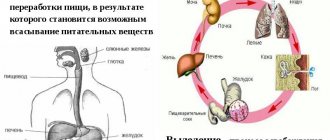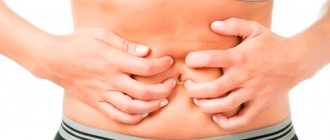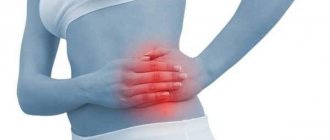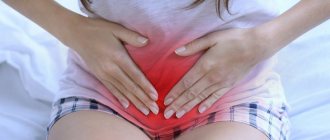Surely everyone has experienced a state where the stomach turns, but there is no diarrhea. These unpleasant sensations are a clear reason to think that something is wrong in the body. Let's get acquainted with the possible causes of this painful condition and find out what to do in such cases.
Each of us is familiar with abdominal pain. This signal of trouble indicates problems that have arisen in the body, which you need to pay attention to and start doing something. Usually when this happens, we suspect an intestinal infection, but since the stomach is not only the intestines, there are many more reasons for the appearance of pain.
Pathological causes
However, there are other more serious reasons. In this case, the stomach turns, but there is no diarrhea. And this symptom is caused by pathology in the body. Many people mistakenly assume that this is a common intestinal disorder.
But abdominal discomfort is not always caused by the intestines; there are many other organs there. How to distinguish pathology from a common disorder.
Many pathological problems have their own characteristics, location of discomfort and accompanying symptoms.
Diseases that cause abdominal discomfort without diarrhea:
- Stomach pathologies. These include gastritis or ulcers. In this case, symptoms begin after eating a particular food. These pathological problems are caused by a violation of the integrity of the gastric mucosa, which means that when an irritant enters, they react sharply to it. The stomach turns without diarrhea.
- Pylorospasm. This is a kind of “latch” between the duodenum and the stomach. Sphincter spasm prevents the easy passage of food. As a result, a person feels discomfort, heaviness in the stomach and nausea.
- Irritable bowel syndrome. Most often, the onset of the disease is influenced by recent stress. Constant nervousness can also contribute to irritable bowel syndrome. Treatment requires the help of not only a gastroenterologist, but also a psychotherapist. Additional signs include: bloating and rumbling in the abdomen, constipation, diarrhea, pain and discomfort. In this case, the stomach turns, but diarrhea also appears.
- Lack of nutritional enzymes, secretion in the gastrointestinal tract. The gastrointestinal tract must produce special elements that help digest food. Some problems reduce their production, which means the digestive system will begin to suffer. Poorly digested food, when it enters the intestines, irritates it. For this reason, the stomach twists, a person experiences malaise and discomfort in this part of the body.
- Intestinal obstruction. A rather serious illness that can lead to serious consequences, even death, if ignored for a long time.
- Pregnancy. Often, women in this position have a twisting stomach, but there is no diarrhea. This happens due to an increase in the hormone progesterone and an enlargement of the uterus.
- Infection with helminths.
- Appendicitis. In this case, vomiting will also appear. The pain will become severe over time. It is necessary to seek help in a timely manner.
- Pancreatitis.
- Internal bleeding.
- Problems of the urinary system.
- Apoplexy of the ovaries.
- Ectopic pregnancy.
You don’t always need to sound the alarm and cut off the ambulance phone. Banal, everyday reasons include:
- Large consumption of fatty foods.
- If you eat an unripe vegetable or fruit, you will most likely experience a “twisting effect” in your stomach.
- There are a number of foods that should not be consumed frequently or in large quantities. This is sauerkraut, tomatoes, pears, apples. Drinks include: beer and carbonated liquid. In this case, the stomach turns, but without diarrhea. Typically, accompanying symptoms include: bloating and increased gas production.
- Allergy to dairy products.
- Binge eating.
- Mild food infection. When a small amount of bacteria enters the body, the immune system is able to cope with it without outside interference.
A person feels this whole process. Intestinal motility is increased and contractions occur without diarrhea.
Treatment options
To get rid of the symptom in a short time, you need to consult a doctor. Based on the diagnosis, a course of treatment is prescribed. As a rule, medications and traditional methods of treatment are used, and a diet is recommended for the first time. The list of medications is different for an adult and a child.
To combat abdominal pain and diarrhea, medications are used:
- Sorbents. The drugs absorb harmful substances and are eliminated from the body naturally. The absorbing effect of certain types of sorbents is aimed exclusively at toxic compounds; they do not remove beneficial bacteria and do not disrupt the intestinal microflora. Activated carbon, Enterosgel, Smecta, Polysorb - sorbents cope with signs of intoxication, help eliminate diarrhea and abdominal pain. The use of drugs is permitted in childhood from birth, during pregnancy and lactation.
- Antimicrobial agents. Enterofuril is an intestinal antiseptic, prescribed for the treatment of diarrhea in adults and children. Available in the form of a suspension or capsules. Allowed for infants over 1 month, pregnant women, nursing mothers. The advantage of using the medicine is that it does not injure the mucous membrane; the medicine does not disturb the microflora of the stomach.
- Rehydration drugs. With diarrhea, excess fluid is removed from the body, which leads to the leaching of beneficial microelements, disrupts the water-salt balance, and is dangerous due to dehydration. A child with diarrhea is susceptible to rapid fluid loss. To replenish fluid, it is recommended to drink enough water and take medications that retain moisture in the body. These are Regidron, Gidrovit, Humana Electrolyte. If the first aid kit does not contain the indicated products, it is possible to replace it with saline solution or salted water.
- Anti-inflammatory drugs. If diarrhea is infectious, antibiotics are prescribed. Pathogenic microorganisms can spread viruses and bacteria in the intestines. Galavit is a drug that copes with diarrhea of viral origin. For children over 6 years of age, it is allowed to be used for therapy.
- Probiotics. Along with loose stools, useful substances are removed from the body. The intestinal microflora is disrupted. When taking antibiotics, probiotics are always prescribed to restore digestion. Linex, Bifidumbacterin, Biogaia, Enterozermina, Bifiform, Normobakt, etc.
- Antipyretic. High fever during diarrhea must be brought down. Take Ibufen, Aspirin, Paracetamol when the temperature rises.
- Stool strengthening agents. Only a doctor has the right to prescribe drugs that strengthen the stool. In some cases, this is strictly prohibited. For example, in case of poisoning, intestinal infections. For diarrhea, Loperamide (Imodium) is used to regulate stool. Women have contraindications for use during pregnancy and lactation.
- Remedies for bloating. If you have an upset stomach, in addition to pain and discomfort in the abdomen, a person may experience severe boiling, bloating, and increased gas formation. To eliminate these symptoms, Espumisan is prescribed.
Traditional methods
After consulting with a doctor, it is permissible to try traditional methods of dealing with loose stools. A list of ways to help cope with symptoms at home:
- Rice. Rice porridge with water or a decoction is used to eliminate diarrhea in adults and children. Rice water is prepared for children. The product is given to drink before meals. On the third day the diarrhea goes away.
- Starch. If your stomach is cramped, you can prepare potato broth. Boil a couple of medium potatoes. The broth after cooking contains starch. Take 100 ml of decoction throughout the day. The second method: dilute a teaspoon of starch in a glass of water and drink before meals.
- Pomegranate. Pomegranate peels are used in folk medicine to treat diarrhea. Peel the fruit, remove the white film from the peels, and dry a little. Steam in a thermos for several hours. Strain the broth. Take before meals.
- Tea. Strong tea is used in the treatment of indigestion. Brew 2 teaspoons per glass of boiling water, drink three times a day.
https://youtu.be/ra5SN2VxoDs
When to contact a specialist
- You should not ignore going to the doctor if you have had any kind of abdominal injury before.
- Abdominal pain.
- The stomach twists and loose stools with blood come out.
- Blood comes out of the nose.
- The fact of the unexpected appearance of menstrual flow cannot be ignored. Especially if their time has not yet come.
- Acute colic.
- Fever.
- When pain sensations have a wave-like character and an increasing pace.
- Vomit.
- Muscle tension.
- On palpation, a sharp pain is felt, and the abdomen itself is hard and enlarged.
- When there is no stool or gas formation.
- Irregular heartbeat and pain in this area.
- Pallor.
- Cold sweat.
Abdominal pain due to taking vitamins
Oddly enough, abuse or misuse of certain vitamin complexes can lead to vomiting, and, consequently, pain in the abdomen.
Improper intake of vitamins often provokes negative reactions in the body, such as nausea, vomiting, and abdominal pain.
Vitamin complexes are used to improve the general condition of the body and strengthen the functionality of the immune system. Very often, experts prescribe taking vitamins in parallel with medications. If the dosage regimen is violated, side effects often occur in the form of weakness, nausea, developing into vomiting, and abdominal pain.
The danger of excess vitamins
The duration of the above symptoms will depend on how quickly self-cleansing occurs in the body. That is, through vomiting, all the contents of the stomach will be removed. If you feel unwell, experts recommend inducing vomiting yourself by first drinking a large amount of water.
If you overdose on medications or vitamins, induce vomiting to empty your stomach.
It is worth noting that some antibiotics and other medications have side effects such as abdominal pain, dizziness, nausea, and others. For example, a similar condition can be triggered by cough medications. Therefore, it is very important to study the instructions in detail before taking the product.
Cough medications often cause side effects such as nausea, dizziness, and abdominal pain.
What to do if you have abdominal discomfort
It is worth emphasizing once again that serious pathological causes should only be decided by the attending physician.
Intervention and help to your body is possible only if you are completely sure that this is normal overeating or indigestion.
In any case, it is worth drinking activated carbon. It won't cause any harm anyway. Activated carbon is a good adsorbent that will eliminate all dyspeptic disorders in the intestines.
The problem of discomfort will be solved as soon as possible if it is not caused by health problems. With the help of the drug, the body will get rid of toxins that were obtained as a result of fermentation and decay.
Useful video
Surely everyone has experienced a state where the stomach turns, but there is no diarrhea. These unpleasant sensations are a clear reason to think that something is wrong in the body. Let's get acquainted with the possible causes of this painful condition and find out what to do in such cases.
Each of us is familiar with abdominal pain. This signal of trouble indicates problems that have arisen in the body, which you need to pay attention to and start doing something. Usually when this happens, we suspect an intestinal infection, but since the stomach is not only the intestines, there are many more reasons for the appearance of pain.
Diseases of the ENT organs
When your stomach hurts and you feel very nauseous, the reasons for this are usually associated with the internal organs located in the abdominal cavity. However, they can be located in a completely different location and be associated with diseases of the ear, nose and throat. For example,
When moving the body to an upright position, nausea can be caused by ear infections. a gag reflex that occurs after sleep in the morning may indicate inflammation of the nasopharynx.
If there are problems with the inner ear, in which the peripheral part of the vestibular system is located, the vestibular apparatus begins to suffer, which causes constant dizziness, nausea, often vomiting, changes in heart rate, jumps in blood pressure, which in turn can provoke sharp pain in the upper abdomen.
Basically, diseases of the ear, nose and throat are inflammatory in nature, since these organs directly interact with the environment. When the balance of microorganisms on the mucous membranes is disturbed, infection occurs and the person becomes ill.
The most common inflammations include:
sinusitis (inflammation of the maxillary sinuses); rhinitis (inflammation of the nasal mucosa); adenoids (enlarged nasopharyngeal tonsil); otitis (inflammation of the ear); eustachitis (inflammation of the auditory tube); pharyngitis (inflammation of the back wall of the pharynx); chronic tonsillitis (inflammation of the tonsils).
Especially often, diseases of the ENT organs are accompanied by vomiting and abdominal pain in children. In this case, the abdominal wall muscles usually do not tense. Then patients should be hospitalized and the abdominal organs examined to exclude developing pathology. At the same time, a thorough examination of ENT organs is carried out and the disease is accurately diagnosed.
Eating the wrong foods
Any digestive disorder is usually accompanied by diarrhea. But not always, it happens that there is no diarrhea. This can occur with physiological disturbances during the digestion of food. In this case, after eating, an unpleasant symptom appears - intestinal twisting, but without diarrhea.
Functional causes of abdominal cramps that occur without diarrhea:
- Overeating and eating incompatible foods can cause discomfort in the intestines in the form of bloating and seething.
- Consumption of foods that contain coarse fiber and contribute to increased gas formation (sauerkraut, beer, kvass, peas, beans, grapes, radishes).
- A mild food infection will cause a feeling of stomach churning. The entry of a pathogenic agent into the digestive tract, which the body is still able to cope with, will increase peristalsis and manifest itself in increased intestinal contractions without diarrhea.
- Neurological causes of abdominal discomfort. Sometimes the stomach turns in a stressful situation and with vegetative disorders.
- Pregnancy, in which functional rumbling in the abdomen is possible without much diarrhea. The reason is the gradual enlargement of the uterus, the position of the fetus and surges in progesterone production.
- The stomach turns when infected with helminths, but there is no diarrhea.
There is a “tornado” in the intestines, the stool is normal - what to drink?
So, what can you drink if there is no serious problem with the intestines, but your stomach is twisting and there is no diarrhea?
Gastroenterologists recommend taking any of the following medications:
- Activated carbon (Sorbex). The most popular and proven remedy that has no contraindications. As a rule, it quickly eliminates all dyspeptic disorders, in which the processes of rotting and fermentation begin in the intestines. The main thing is to choose the right dose: per 10 kg of body weight – 1 tablet. This is the only way you will get the desired relief;
- Espumisan. If your stomach is “digested” due to increased gas formation, then this medicine will be your salvation. It looks like small gelatin capsules. It acts very gently, although not too quickly. Take 2 tablets at once;
- No-spa (2 tablets at once) is the number one lifesaver for any abdominal discomfort. An excellent antispasmodic. Spazgan and Baralgin produce a similar effect. They will remove spasms and colic;
- Smecta – 1 powder in half a glass of water. It has the ability to absorb gases, have a calming effect on the mucous membrane, and remove waste and toxins from the body. Moreover, the product is allowed even for pregnant women;
- Mezim, Festal, Panzinorm. Enteric-coated tablets. They contain enzymes that will help the stomach efficiently digest food when overeating and eating unusual foods, and will eliminate flatulence and heaviness. These drugs are excellent for intestinal infections;
- Motilium, Raglan, Cerucal. They regulate the motor activity of the stomach (namely, due to the fact that the food received there is poorly digested and begins to ferment in the intestines), relieve bloating, nausea and heaviness. Standard dosage – 1 tablet. in three steps;
- Drops Hilak forte. Effectively restore intestinal microflora, eliminate malfunctions of the digestive tract. You should drink them like this: 40-60 drops. dilute in tea, water (not milk!), take half an hour after you eat. Daily regimen – 3 times. When it gets better, the dose can be reduced;
- Enterofuril. Destroys pathogenic microorganisms that have settled in the intestines, cures all intestinal infections, but does not spoil the normal microflora. Its intake is not associated with food consumption. Available in suspension and capsules. Dose for adults – 5 ml of suspension up to 4 r. per day at regular intervals or 1 caps. (200 mg) 4 r. in a day;
- Antacids (reduce acidity in the stomach) - Phosphalugel, Rennie, Maalox, Gastal. Relieves pain and heartburn.
After taking the medicine, even if it has worked and the unpleasant symptoms have disappeared, do not eat any food for 6 hours. You can only drink weak tea with crackers. Then eat lightly for a while.
Caution: Emergency
But sometimes the appearance of abdominal pain is due to a more serious reason. In some conditions that require urgent surgical care, the stomach also turns and there is no diarrhea. What does the concept of “acute abdomen” mean and why is it dangerous?
In an acute process, the pain is somewhat different, it differs in intensity and duration. Sometimes it is difficult to understand what is wrong, so a doctor's examination is necessary. An acute abdomen can occur as pseudo-abdominal syndrome with myocardial infarction, pyelonephritis, and pneumonia. In these cases, treatment is conservative and does not require surgery.
A more dangerous condition is one in which emergency surgery cannot be avoided. Delay in hospitalization is dangerous for the patient’s life. These conditions include:
- Suspicion of acute appendicitis. It is dangerous due to rupture of the appendix and the development of peritonitis.
- Cholecystitis is inflammation of the gallbladder. In this case, a sharp disruption of the outflow of bile occurs when the bile duct is obstructed by a stone. It is treated conservatively in the surgical department, but surgical intervention to remove the gallbladder cannot be ruled out.
- Pancreatitis is an acute inflammation of the pancreas, in which complete or partial necrosis of the gland occurs. A very dangerous and threatening condition with a high degree of mortality.
- Exacerbation of stomach ulcers. Usually accompanied by acute pain, mainly after eating. But there are cases of dull, twisting pain in the abdomen.
- Intestinal obstruction can only be treated surgically.
- Gynecological pathologies - ectopic pregnancy, ovarian rupture, require urgent surgery.
- Bleeding of internal organs.
- A pinched hernia is a dangerous complication in which compression of the internal organs located in the hernial sac occurs. Treatment is only surgical; delaying surgery can lead to the development of peritonitis.
What should you do if you suspect an emergency? The answer is clear: urgent medical attention is needed; delay can be dangerous for the patient’s life.
Painful discomfort in the abdomen, even in the absence of diarrhea, is a reason to consult a specialist. Letting a problem go by itself and hoping that everything will go away can cost your health, and sometimes pose a danger to life. Take time for yourself and see your doctor.
What is the probable root cause of the fact that the stomach is twisting, but there is no diarrhea, and what actions should be taken if you feel like this.
Relatively safe factors
The most common reasons for this kind of discomfort are domestic ones:
- Banal overeating;
- Eating “heavy” dishes or low-quality products;
- Eating unripe, “green” fruits and vegetables;
- The intestines rotate without diarrhea with excessive consumption of carbonated or alcoholic products. At the same time, bloating and increased flatulence may occur;
- Autonomic indigestion;
- Allergic reaction to dairy products;
- Mild food poisoning, which the body copes with on its own, without the appearance of diarrhea.
In such cases, it is enough to take medications aimed at relieving pain symptoms and facilitating the functioning of the digestive system. After a short period of time, the discomfort usually goes away.
Pathological processes causing painful symptoms
The stomach hurts as with diarrhea and for more serious reasons, indicating a potential pathological situation in the body, and this should not be confused with a simple intestinal disorder.
In addition to the gastrointestinal tract, the human body has quite a variety of organ systems. Any disease has its own distinctive features, location and accompanying symptoms.
Here are just a few of the factors that make your stomach hurt like diarrhea, but there is no diarrhea:
- Irritable bowel syndrome. Any stress experienced, as well as various psychological experiences, has a great influence on the course of the disease. The patient should be observed by a gastroenterologist and a psychotherapist. At the same time that the stomach is constantly twisting, but there is no diarrhea, there is flatulence, rumbling, and pain.
- Pylorospasm. The rapid contraction of the sphincter located at the border of the stomach and duodenum prevents the normal passage of digested food. Therefore, there is a constant feeling of heaviness in the stomach, nausea and discomfort.
- Inflammatory stomach diseases such as gastritis or ulcers. The mucous surface is damaged, so when certain foods come in, the stomach turns, but there is no diarrhea.
- Lack of sufficient amounts of nutritional enzymes necessary for digesting food. Food is poorly digested and intestinal irritation begins. As a result, my stomach hurts like diarrhea.
- Intestinal obstruction. This is a rather serious pathology that cannot be ignored and is fraught with the fact that, in addition to various complications, it can be fatal.
- Appendicitis. Accompanied by vomiting and severe pain. Urgent surgical intervention is required to exclude the development of peritonitis.
- Pregnancy. The abdomen twists without diarrhea due to an increase in the amount of female hormone in the blood, as well as expansion of the volume of the uterus.
- Ectopic pregnancy.
- Helminthiasis.
- Renal pathology.
- Pancreatitis. When your stomach turns, but there is no diarrhea, this may be an inflammation of the pancreas. There is a threat of developing pancreatic necrosis, when, in the absence of medical intervention, part of the pancreas dies.
- Internal bleeding.
- Pinched hernia.
- Cholecystitis, which threatens the development of jaundice.
- Pathologies associated with the genitourinary system.
Pain in the stomach and pancreas
The pancreas is an organ located deep in the abdomen, located horizontally at the top next to the stomach. When inflamed, it radiates strongly to the back, and it is easier for the sufferer when he sits. The person feels very sick and sweats. The cause is acute inflammation (pancreatitis), neoplasms in the pancreas.
The upper left area contains the stomach, spleen, and left part of the diaphragm. Unpleasant sensations here are not observed as often as in the right; they will be caused by irritation of the gastric mucosa with poor-quality food, alcohol, and medications. The pain varies in severity and is accompanied by vomiting. The use of acid-reducing drugs has a positive effect. When relief does not occur, you should see a doctor - gastritis or a stomach ulcer is possible.
Symptoms can also be caused by stomach spasms, narrowing of the pylorus, which prevents the normal passage of food, and tumor processes.
Dangerous symptoms
Some signs may indicate that there is a serious or even dangerous problem in addition to the condition when the stomach is very twisted, but there is no diarrhea, indicating the need to immediately seek help from a doctor:
- Any injuries in the abdominal area;
- Unbearable pain in the stomach area;
- Bloody diarrhea appeared;
- There is bleeding from the nose;
- Menstruation is not on schedule;
- Cutting pain;
- High body temperature;
- Vomit;
- Muscle spasm;
- When palpated, the abdomen is hard and enlarged in size;
- Failure of heart rhythm and chest pain;
- Pale skin, increased sweating.
Such conditions can be a signal of various gynecological problems (such as a tumor in the pelvic organs, rupture of a tube, ectopic pregnancy), or indicate inflammation of the kidneys, glomerulonephritis and even myocardial infarction.
Prevention of discomfort
It is worth noting that there is no need to self-medicate, but you should contact a specialist who, based on tests or a general examination, will make the correct diagnosis and prescribe the necessary therapy.
If your stomach is twisting, but there is no diarrhea, it could be either simple overeating, indigestion, or a more dangerous illness. Only if you are completely sure that the patient has nothing serious can you take the following steps:
- Drink activated carbon. A known adsorbent agent absorbs various gases, toxins, allergens, etc. from the intestines, causing fermentation and putrefaction processes. In the absence of serious health problems, the sensation of pain, heaviness and discomfort will soon pass. The tablets have no contraindications.
- If a person has simply overate, there is flatulence, gas is released, it is necessary to take Espumisan - an excellent remedy in the fight against the condition when the stomach is twisting, but there is no diarrhea. The release form of this drug is different. For adults, tablets or capsules are suitable, and a child can take a liquid suspension.
- If pain is observed after the next meal, No-spa, which is a good antispasmodic, will help out. In addition, you can take Drotaverine - it has a similar effect.
- Smecta is used to remove toxins and relieve discomfort. It protects and soothes the mucous membrane of the inner surface of the stomach. This remedy can also be taken by pregnant women. Enterosgel is considered a similar medicine.
- If the pain begins to bother you while eating, you can pause and try drinking a small amount of water.
- You should try to avoid eating too spicy, salty, fatty foods, chocolate, and alcoholic beverages.
Important! If your stomach constantly turns, but there is no diarrhea, this is an alarming signal and you should definitely consult a doctor. Self-medication can lead to irreversible pathological processes.
What decoctions will help if you have a stomach ache?
This condition can be caused by many reasons, from harmless to very dangerous. In the latter case, other symptoms are added: fever, pain, vomiting, weakness, pallor, rapid heartbeat. This may indicate gastritis, ulcers, irritable bowel syndrome, pylorospasm, pyelonephritis, cholecystitis, the onset of an attack of appendicitis, intestinal obstruction, even a heart attack.
In women, suspicion may fall on ovarian rupture and other gynecological problems. It is clear that there is no question of any self-medication here; you need to urgently call an ambulance. Taking any medications will only erase the picture of the disease and make it difficult to make a diagnosis.
If your stomach turns after (or during) eating, the reasons may be: intolerance to any product - often fatty or causing fermentation and gas formation (sauerkraut, pears, mushrooms, peas, beer, kvass, carbonated drinks, radish, kiwi , raisins, unripe fruits).
If pain occurs on an empty stomach or 30 minutes to an hour after eating, it may be an ulcer. Usually, if discomfort is associated with eating, then the problem is a disruption in the functioning of the gastrointestinal tract. The appearance of seething in the abdomen against the background of complete health may indicate infection with helminths.
We will analyze only those cases when the “storm” in the stomach is a consequence of a short-term reaction of the body to the foods you consumed, or the intestines “rebel” due to the fact that you forgot to feed it. What can you do to restore your normal state of health?
In the “grandmother’s recipe book” there are also remedies for those who are not too fond of pharmacy “chemicals”.
Here's what you can do if your stomach is twisting, but you don't have any suitable medications at hand, or if you're simply afraid of the side effects of taking pharmaceutical drugs:
- brew chamomile. For a glass of boiling water, take 1 tbsp. l. flowers. Take half a glass of this mixture half an hour before meals;
- Prepare tea from blackcurrant leaves. It will relieve inflammation and have an analgesic effect. Just put a handful of leaves in a thermos, pour boiling water over them and leave for at least an hour;
- dissolve 50 drops. calendula tincture in 50 g of boiled water. This solution will relieve stomach pain;
- Make a decoction of cumin seeds. Experts in traditional medicine claim that this is the most effective remedy. You will need 2 tbsp. l. seeds Fill them with 4 tbsp. water, boil for 5 minutes. Cool and strain. Drink on an empty stomach;
- take a decoction of fennel seeds: 1 tsp. seeds, brew 200 ml of hot water. Cover the container with a lid. In 10 minutes the composition will be ready. Strain it and drink it three times a day.
If you periodically experience stomach churning, but no diarrhea, then now you know what medications to put in your purse as an emergency aid.
But if you approach the problem more thoroughly, then it is better to solve it radically - go to a gastroenterologist and try to find out what is dissatisfied with your intestines. Perhaps the doctor will prescribe treatment that will help you forget about this trouble forever.











